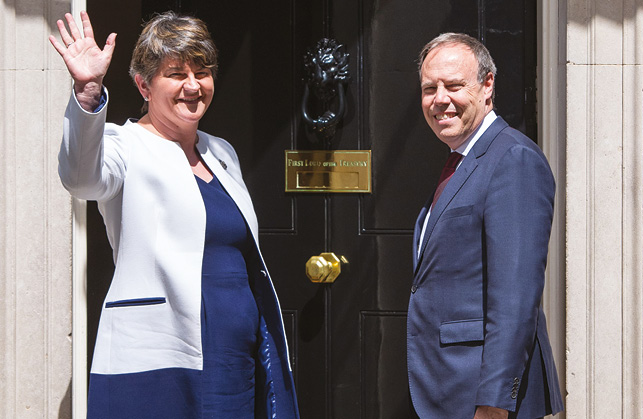The DUP deal and the implications for the Barnett Formula


The Agreement between the Conservative Party and the DUP on parliamentary support for the UK Government has resulted in much criticism from the Scottish and Welsh Governments, Derek Birrell writes.
In July 2017 the governments initiated a formal dispute resolution process on the grounds that the additional funding for Northern Ireland does not respect the funding principles and rules of the Barnett Formula.
The basis of public funding by the UK Government of Northern Ireland since 1980 has been the Barnett Formula, which is also applicable to Scotland and Wales. Barnett is used to determine allocations on the basis of inherited levels of expenditure and proposed changes in expenditure. The Formula itself reflects: change to UK departments’ spending x comparative percentage devolved x population proportion. While the Barnett Formula determines the overall allocations the devolved administrations have discretion over how the total sum is divided up between devolved programmes. The Barnett Formula has proved controversial, most commonly on the grounds that it is not based on a calculation of need and contributes to an unequal distribution. Public expenditure per head for 2015-6 was £10,983 for Northern Ireland, £10,536 for Scotland, £9,996 for Wales and £8,816 for England. The Formula has operated to maintain the relative spending levels in the different parts of the UK. It has proved a robust mechanism and resistant to campaigns for change and has been strongly supported by the UK Treasury.
The Formula is simple to apply, avoids the need for annual negotiation and bargaining, delivers a stable and largely predictable allocation, maintains a relatively stable per capita expenditure, and has produced limited conflict over allocations. The alternative of a needs based assessment would also distract from the discretion of the devolved governments to assess needs in their spending.
Although Barnett determines the main annual allocation, other expenditure by the UK Government during the financial year may have what is called Barnett consequentials. If the expenditure is comparable it triggers consequential allocations to the devolved administrations. Comparable expenditure is the extent to which the services delivered by the UK departments correspond to services within the budgets of the devolved administrations. Spending which is non-comparable is that which is UK wide.
This distinction has not always been clear cut and has given rise to controversy at times, for example, UK Government expenditure on the London Olympics was treated as of benefit to the whole UK and had no consequences for a devolved allocation, despite protests.
The agreement between the DUP and the Conservative Government detailed additional financial support to Northern Ireland of £1 billion for two years covering £400 million for infrastructure development, £150 million for ultrafast broadband, £100 million for added pressures in health and education, £200 million for health service transformation, £50 million for mental health and £100 million to tackle pockets of severe deprivation.
The Scottish and Welsh Governments expressed their fundamental disagreement with the additional finance stating that this represented a change in allocations by the UK Government for devolved functions. They argued that health, education, infrastructure, broadband, and deprivation were all devolved matters giving rise to the Barnett consequentials estimated as £2.9 billion for Scotland and £1.7 billion for Wales.
The UK Government took the view that there were no Barnett consequentials. While the Barnett Formula does not have a statutory basis, its operation is set out in a Treasury document ‘Statement of Funding Policy’, describing how the funding of the devolved administrations is determined. The Scottish and Welsh Governments took the view that the UK Government’s position was inconsistent with the terms of the Statement of Funding Policy.
The UK Government suggested, however, the deal was a targeted intervention to address a specific set of circumstances with exceptional funding outside Barnett. In response the Scottish and Welsh Governments argued that the funding deal covered routine expenditure and did not reflect unique circumstances in Northern Ireland.
Paragraph 2.14 of the Statement of Funding Policy does allow a programme to be exceptionally regarded as unique at the UK level but clearly states that the assessment of whether a programme is unique at UK level and outside Barnett, should be exceptional. Furthermore, any such assessment should be evidence based and considered by Treasury ministers and their counterparts in the devolved administrations before a final decision. The agreement with the DUP was not considered in this way.
The Prime Minister and Ruth Davidson, the Scottish Conservative leader, also suggested that the funding arrangement with the DUP is similar to those used for city deals with councils in Scotland and Wales. However, a difference is that city deal funding is conditional on matching funding from the devolved governments and contributions from local councils and other partners.
The Scottish Government reached the conclusion that the deal prioritises expenditure in Northern Ireland at a cost of all the other parts of the UK and disregards the well established arrangements in the Statement of Funding Policy. The Welsh Minister for Finance stated it was simply inexcusable that the UK Government is willing to bypass these rules. The First Minister for Wales saw the deal as killing the idea of fair funding and further weakening the UK. The Scottish First Minister spoke of sacrificing the very basic principles of devolution. Some confusion was caused when the Conservative Secretary of State for Scotland originally said he would not support funding which deliberately sought to subvert the Barnett rules. The Scottish Minister of Finance invoked the financial disputes processes, set out in the Devolution Memorandum of Understanding and Supplementary Agreements.
 Derek Birrell is a Professor in the School of Criminology, Politics and Social Policy at Ulster University
Derek Birrell is a Professor in the School of Criminology, Politics and Social Policy at Ulster University
Such is the significance attached to the issue by The Scottish and Welsh Governments that they are now pursuing the more formal disputes resolution mechanism through the Joint Ministerial Committee of the UK and devolved Governments.
It is unlikely that these actions will lead to any change in the deal whether or not Scotland and Wales receive any regress. There may, however, be other consequences. It may lead to some alterations in the Statement of Funding and support demands for the creation of an independent adjudicator for defining comparability.
It may also endanger the principle of the UK Government and devolved administrations working together in a spirit of mutual respect and may also further undermine the Barnett Formula.
Barnett is already under increasing pressure with Scotland and possibly Wales using devolved tax revenues to provide an increasing proportion of resources and with Brexit raising issues whether funding for repatriated functions such as agricultural subsidies will fall under Barnett or not.





